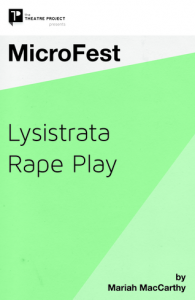 There’s nothing funny about rape. I mean … is there? No. Of course not. It’s brutal, vicious and terrifying, a crime that makes no sense, can be difficult to prove, and - even in today’s society – leaves the victim stigmatized. In fact, most victims are embarrassed to report their rape, let alone discuss it – even with (or, sadder still, especially with) close friends and family members.
There’s nothing funny about rape. I mean … is there? No. Of course not. It’s brutal, vicious and terrifying, a crime that makes no sense, can be difficult to prove, and - even in today’s society – leaves the victim stigmatized. In fact, most victims are embarrassed to report their rape, let alone discuss it – even with (or, sadder still, especially with) close friends and family members.
Guaranteed - several of your friends have been sexually assaulted in some manner and you have no idea. You may think you know everything about someone, but their rape is often a dark fact they’ve pushed down and hushed up which becomes their own dirty little secret rather than their unfortunate violation. The rape will go with them to the grave. Why? Because it’s just easier that way. Huh.
So, while there is nothing funny about rape, what CAN be satirized, parodied, explored and lampooned is the society in which there exists a crime where blaming and shaming the victim is routine. A country where doubting the victim’s story and policing the victimized population by dictating what they should wear, how much they should drink, and how they should act is considered the norm. Start to understand the inherent foolishness and stupidity of this and frankly you’re looking at a play where the jokes just start writing themselves. Then see that the play is written by Mariah MacCarthy and … well … suddenly a dark comedy about rape seems like it’s a play whose time has come.
Lysistrata Rape Play: the title alone should be evidence enough that subtlety is not going to be the direction in which this play is going. MacCarthy tends to do this pretty consistently: title her plays exquisitely boldly with definitions of what you will get upon arrival (see Genderfuck Cabaret , Foreplay Play or Ampersand: A Romeo & Juliet Story). It’s reminiscent of that tried and true Chinese takeout you’ve relied on for years to get you through weekends and hangovers. The menu says Chicken and Broccoli and what arrives at your door is Chicken and Broccoli. The other thing MacCarthy tends to do pretty consistently: like that little Chinese gem around the corner, the secret to her success is the way she piles her story-lines high, not afraid to over-stuff the plot in an effort to get the point across. And, like takeout … she’ll always deliver. 
So, let me break it down for you. Lysistrata Rape Play does, indeed, echo the classic Greek Lysistrata by Aristophanes in which women – in an effort to force their men to broker a peace – withhold sex from them. In Rape Play, however in the wake of a particularly headline-grabbing rape that is being held out as a beacon cry for change, women are being urged to withhold sex from their men until all rape stops. Sounds crazy, no? It’s a situation that, even before you begin to wrap your mind around it, you can already find yourself poking holes through. ”But what if ….?” ”And what about the …?” ”And does that mean all …?” ”But wouldn’t that only mean …?” But of course Lysistrata Rape Play isn’t set up to present only one side – that would be the shortcut. And if MacCarthy was fond of shortcuts she’d be the type of writer who wrote very different plays. Ones that weren’t about gender identity, group sex and now … rape.
Rape is discussed, defined, debated, depicted, reenacted, committed, avenged, and ultimately … or so a perfect world would have you believe … eradicated.
In the not-too-distant future of MacCarthy’s Lysistrata Rape Play the US is run by a strong, willful woman who is both broad minded as well as tunnel visioned. She is, as some would describe her – both to her face as well as behind her back – vulgar … a description she seems to both toss aside as well as relish. It bemuses her for its very indication that she is a woman in a man’s world who is taking on a fiercely sexual issue and bringing her politics into America’s bedrooms.
She sets down a ban on sex and, while making it clear that it is more of a “voluntary” opt-in rather than a law, ad hoc patrols are set up throughout society to enforce the new “suggestion” leading woman to turn against woman should any be found breaking rank. This keeps the Matriarch’s hands clean while ensuring that, in essence, America has now become a police state. America is now a nation where loving couples are terrified of expressing their devotion to each other for fear of punishment, imprisonment or even mutilation. Even allies are considered enemies. And the darkest enemies are lurking in the kindest hearts.
MacCarthy intentionally throws the net wide – catching every possible thought, motive, issue, fallout, ripple, consequence – both intended as well as unforeseen by her characters – in order to illuminate not only every issue, but every side of every issue. During the course of Lysistrata Rape Play these textured, endearing and tremendously earnest characters allow us to walk a mile in their sexless-therefore-sexually-frustrated shoes. How would it affect marriages? Friendships? Sexuality? The sex workers? The chain of power? How would it corrupt? How would it implode? How would it change society’s structure? How would people cope? Who would stay and fight? Who would run and hide? Who would do things they never expected to do? For better? For worse? Much, much worse?
Lysistrata Rape Play takes the topic and gives a series of “if / then” scenarios where each hero is all the more enticing because they are flawed, each “villain” actually makes sense, and there are degrees of good and evil that often meet in the middle. MacCarthy’s gift is being able to write characters who are often at odds with themselves and who betray not only themselves but their best friends, their loved ones … and those they have no idea they are affecting. Yet throughout, they clearly express their own confusion at their own actions in a way that defines their motivations. While the audience may not identify with anyone in particular, there are moments when we identify with all of them at least once.
While I was cautioned that this was a simple workshop and not to expect a full-blown production I came away from Lysistrata Rape Play feeling strongly moved and affected by what I’d seen, and frankly didn’t see much lacking. The performances where superb, the message was strong and the theme was fully realized, both in homage to the original Lysistrata as well as in the brand new world it was meant to capture. If this was a simple first incarnation I can’t wait to see this play re-mounted.
Rape, it has been said over and over again, is not about sex. It is about power. The message here is: In the fight against rape, the way to combat its insidiousness is diffuse its power. With laughter … with knowledge … and with equally powerful messages. So don’t be afraid to say the word rape. And don’t be afraid to reclaim the power of understanding when it’s okay to laugh at the things that are ridiculous. The only way to change something is to refuse to stay silent about it.
~~~
Lysistrata Rape Play was part of MicroFest and ran for 3 days only. Look for future updates to find out more about when you can see a full scale production of this play.








{ 0 comments… add one now }